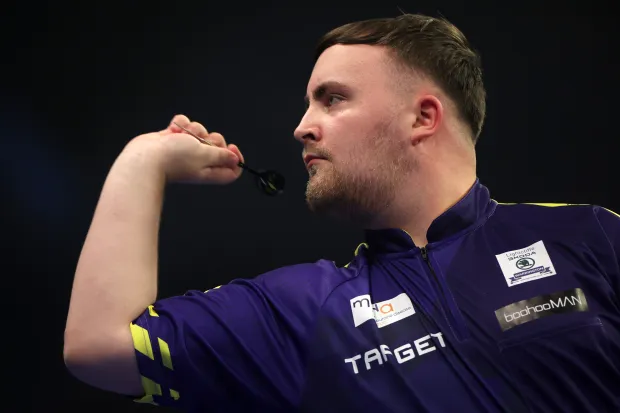
In an extensive and thought-provoking interview with Sky Sports, Barry Hearn, the president of the Professional Darts Corporation (PDC), shared his insights into the dynamic future of darts. He discussed the emergence of young talents like Luke Littler, the challenges facing established stars, and the evolving landscape of the sport’s premier event—the World Darts Championship at Alexandra Palace. As the sport gears up for the highly anticipated championship from December 15 to January 3, Hearn’s reflections provide a compelling glimpse into the forces shaping modern darts.
The Rise of Luke Littler and the Tsunami of Young Talent
Luke Littler’s rapid ascent has captivated the darts world, but Hearn warns that Littler is not an isolated phenomenon. Instead, he represents the vanguard of a new wave of young players ready to shake up the PDC Order of Merit. “If I was an existing top player, I would be going back to the dartboard and starting again,” Hearn emphasized. “These kids are coming with no fear, no pressure—they’re just playing the game.”
The seasoned darts veterans, accustomed to their lifestyle and steady income streams, now face a new reality. The likes of Luke Littler, free from the burdens of mortgages or family responsibilities, approach the sport with an unbridled passion and focus. “These kids haven’t got the same pressures. They don’t have the financial responsibilities or the weight of maintaining a ranking. They’re here to play and win,” Hearn noted. This fearless approach makes them formidable opponents, potentially more dangerous than seasoned professionals.
Hearn elaborated on the mindset of these young players. “When you ask them what they’ll do with their winnings, they shrug and say, ‘I’ll go home and play my Xbox.’ That’s frighteningly dangerous for the competition,” he said with a wry smile. This lack of external pressure allows young talents to perform with a level of freedom that established players may find difficult to match.
The Challenge for Established Players
The influx of youthful talent presents a stark challenge for the established elite. Hearn stressed the need for top players to reassess their approach. “There is a tsunami of talent coming, and these guys have a very simple choice: retire or go back to the drawing board. Perhaps some have become a bit complacent,” he suggested.
For established players, the stakes are higher than ever. The financial rewards in darts have grown significantly, with top players earning between £2 million and £3 million annually. “It’s not quite boxing money, but these guys are competing every week,” Hearn pointed out. This consistent competition means there is no safety net. “Years ago, you could predict 90% of the winners in the early rounds. Today, I’d be surprised if I got 50% right. That’s the healthy side of the sport—it’s unpredictable.”
The PDC’s two-year ranking system ensures a level playing field. “If you don’t produce results in two years, you deserve to drop down,” Hearn asserted. This system, while frustrating for some, ensures that only the best-performing players maintain their positions. “It works the other way, too. These young talents have two years to make their mark, and many are doing so spectacularly.”
The Future of the World Darts Championship at Alexandra Palace
Another significant topic Hearn addressed was the future of the World Darts Championship at Alexandra Palace, affectionately known as Ally Pally. The iconic venue has become synonymous with the championship, but as the sport grows in popularity, Hearn is considering the need for a larger venue. “The demand for tickets is higher than ever, and we need to think about how we can accommodate more fans,” he explained.
Ally Pally’s atmosphere is legendary, but the PDC president acknowledges the potential benefits of expansion. “We want to provide more opportunities for the general public to attend. A bigger venue might be the answer,” he said. However, any decision to move the championship would not be taken lightly. “We need to balance tradition with the sport’s growth. Ally Pally is special, but we can’t ignore the fact that darts is attracting a global audience. We want everyone to experience it.”
Reflections on Darts’ Golden Era
Hearn also took a moment to reflect on his more than two decades with the sport. When asked whether darts is currently experiencing its best era, he didn’t hesitate. “Absolutely. The talent pool is deeper than ever, the competition is fierce, and the level of professionalism has skyrocketed,” he declared.
In Hearn’s view, the rise of players like Luke Littler is evidence of darts’ bright future. “These young players are changing the game. They’re pushing the boundaries and forcing the established stars to adapt. That’s what keeps the sport exciting.”
The PDC’s Role in Shaping the Future
Looking ahead, Hearn emphasized the PDC’s commitment to providing opportunities rather than guarantees. “Our responsibility is not to help people win but to give them the opportunity to change their lives,” he said. This philosophy underpins the PDC’s efforts to nurture talent and expand the sport’s reach globally.
The upcoming World Darts Championship promises to be a showcase of this new era. With a mix of seasoned professionals and rising stars, the competition is expected to be more intense than ever. “It’s going to be a thrilling few weeks. The unpredictability is what makes darts so compelling,” Hearn concluded.
As the darts world prepares for the championship, Barry Hearn’s insights offer a fascinating glimpse into the sport’s future. The rise of Luke Littler and his peers signals a changing of the guard, one that promises to keep fans on the edge of their seats for years to come.
Leave a Reply